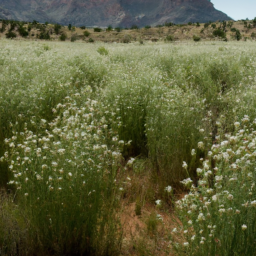Apache, Cochise, Gila, Graham, Greenlee, and Santa Cruz counties in Arizona currently have no medical marijuana dispensaries. Yet each county is home to several Native American tribes, including the Burns Paiute Tribe, Yavapai-Apache Nation, Hopi Tribe, and others. These tribes have the sovereignty to legalize cannabis on their lands, and some have already done so.
One example is the White Mountain Apache Tribe, which legalize medical marijuana in 2015 and opened its first dispensary in 2019. The Fort McDowell Yavapai Nation also legalize medical marijuana in 2019 and is in the process of opening a dispensary. These developments have led to cooperative conservation work crews and noxious weed control programs, as the tribes aim to cultivate their own cannabis and prevent the spread of invasive species like Apache Weed.
Despite being a non-native invasive species, Apache Weed has become a hot topic in Arizona's cannabis industry. This plant is known for its rapid growth and ability to spread quickly, which has led to concerns over its impact on the environment and other crops. In response, some cannabis growers have turned to natural methods of weed control, such as using beneficial insects or cover crops, to avoid the use of harmful chemicals.
Bobby Weed Golf Design completed a multi-year modernization project on the Apache Stronghold Golf Course in San Carlos, Arizona. The project included improving the irrigation system, rebuilding several greens, and expanding and enhancing the driving range tee area. This project demonstrates the potential for cannabis tourism to boost local economies, as visitors may be drawn to areas with legal cannabis and other recreational activities.
From Washington State to Nevada and New York, indigenous cannabis ventures have emerged as a way for tribes to generate revenue and exercise their sovereignty. legal marijuana has been a boon to state economies across the country, and tribes are looking to capitalize on this trend. However, there are concerns over the potential impact on traditional cultural practices and the need for proper regulation and oversight.
In February 2021, a man was arrested in Graham County for transporting more than 55 pounds of marijuana to his home in Missouri. This incident highlights the ongoing issue of illegal drug trafficking, which can be exacerbated by the presence of legal cannabis in neighboring states. It also underscores the need for proper regulation and enforcement to prevent diversion and illegal activity.
In Arizona, the legal of recreational marijuana in 2020 has led to a surge in sales and tax revenue. However, the lack of delivery services has been a point of contention for some consumers and businesses. The Arizona Department of Health Services is currently developing rules for delivery, which could open up new opportunities for the industry and increase access for patients and consumers.
In conclusion, the presence of Apache Weed in Arizona and the legal of cannabis on tribal lands have significant implications for the state's cannabis industry. From environmental concerns to economic opportunities, there are many factors to consider as the industry continues to evolve. Proper regulation and oversight will be key to ensuring safe and responsible use of cannabis in Arizona and beyond.
